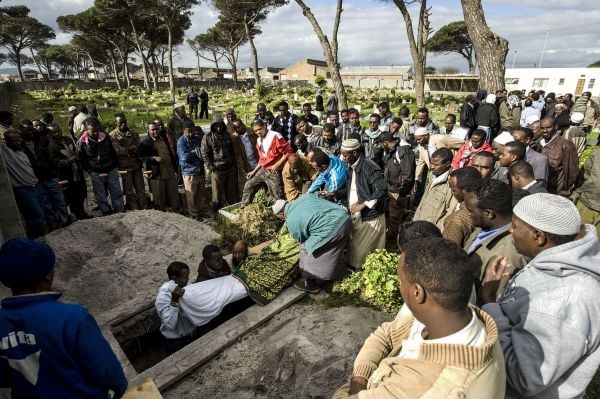Joseph Muhammad
On Tuesday, teenager Ismail “Sakin” Ali became the 21st Somali to be killed in the city of Cape Town’s townships in 40 days. But hardly anyone seems to have noticed as the murders have become routine and arrests few and far between.
This is according to the Somali Community Board of South Africa, a civic group that has monitored attacks on the country’s foreign nationals for five years.
“This is normal — every second day of late, we are experiencing multiple deaths in a single night,” claimed Amir Sheikh, the board’s chairperson, this week.
The sun was about to set when two men walked into Ali’s one-roomed spaza shop in Site C in Khayelitsha, Cape Town, and started spraying bullets towards the teenagers behind the counter. The 18-year-old was killed instantly but his two friends escaped being injured by the assailants, who sped off in an unmarked car.

[Abdirahman Ali Mohamud, who was burnt to death in his shop in Philippi, is buried at the Muslim cemetery in Athlone, Cape Town (David Harrison/M&G)]
Somali nationals being targeted in business robberies is now considered normal and the deaths that follow have come to be expected, Sheikh told the Mail & Guardian.
Three days earlier, on Saturday morning in the Cape Town township of Philippi, another Somali shopkeeper was murdered in the Jumbo Cash and Carry parking lot.
The incident was captured on closed-circuit television cameras and, despite the gates being manned by armed guards, the men were able to carry out the “assassination” and escape.
“We suspect that happened with help inside. Most of the time our members are actually followed from that specific cash-and-carry and either attacked at their businesses or when they go to offload,” Sheikh said.
In both cases, the killers appeared to be conducting a business robbery, but only a few weeks earlier in Polokwane, Limpopo, Somali-owned shops were set alight without any goods being taken.
“Their business was set alight and two shopkeepers were burned alive as they were trying to save the stock inside the building,” Sheikh said.
The community board isn’t sure whether the attacks are xenophobic or just business robberies.
“The motives are really not clear. Some of the places [spaza shops] were burned and nobody was in the shop after the looting. Others, they kill the people in the shop and take nothing,” Sheikh said.
The Somali Community Board monitors attacks on their countrymen across South Africa and in January, based on the trends, it predicted that at least 150 Somalis would have been killed by the end of the year. The estimates are based on reports from local Somali forums in townships across the country, Sheikh said, adding that 2017’s prediction has been revised to 300 in the wake of the recent attacks.
“As per our office stats, the number of Somalis killed in South Africa in the past five years is 723. The numbers may be higher than that but can’t be lower … we haven’t recorded the deaths of undocumented Somalis,” Sheikh said.
The Western Cape is the most dangerous place for Somalis to set up shop, he said. More than half the 120 murders last year happened in Cape Town’s townships.
Although the civic group offers a comprehensive data set of attacks on Somalis, verifying the claims is near impossible without access to police reports, said the African Centre for Migration and Society.
“We don’t have good data on the number of xenophobic attacks, mostly because they are not reported because people don’t trust the police. When it is reported, it’s just reported as crime and not xenophobia,” researcher Zaheera Jinnah told the M&G.
A high number of killings in one month is usually reported as a flare-up of violence, but is most often only a slight escalation of the norm, Jinnah said.
Known as small-scale traders that operate predominantly in townships, Somalis are one of four foreign nationalities that are most at risk in South Africa, Jinnah said.
“Somalis, along with Ethiopians, Bangladeshis and Pakistanis, are particularly vulnerable.”
“Our research indicated that [attacks] are largely driven by local business owners in townships who see them as a business threat,” Jinnah added.
Other triggers for violence against foreign nationals have been identified as a vacuum in local leadership structures and service delivery protests.
In response to the apparent onslaught, Somali communities have been arming themselves.
Earlier this year, South Africa witnessed its first-ever anti-immigrant march in the city’s capital, Tshwane. Residents from Mamelodi, Soshanguve and Ga-Rankuwa were bussed in and held a march demanding that Somalis and other foreign nationals leave South Africa.
In response, the Somali community in Pretoria West staged a countermarch — leading to a scuffle between protesters in which metro police intervened with teargas and stun grenades to separate the crowd.
Sheikh decried the decision by some Somalis to get weapons, but said it was because they felt vulnerable. “The frustration of law enforcement has led to some of our members arming themselves. We condemn it but they have no option but to protect their interests.”
The migration centre said the countermarch by Somalis was the first of its kind in South Africa.
“They armed themselves very well and staged an effective countermarch. I suspect that the data being produced now, if correct, could be a response to that mobilisation,” Jinnah said.
The centre found that Somalis have one of the strongest networks of foreign national communities in South Africa, and their ability to mobilise support for their cause is therefore not surprising.
“There are pre-existing structures which foster solidarity and sharing of information and resources, and it’s likely this could include arming themselves as a means of self-defence. They are also very quick to explain that it’s because they don’t find any protection from the police, only further victimisation,” Jinnah added.